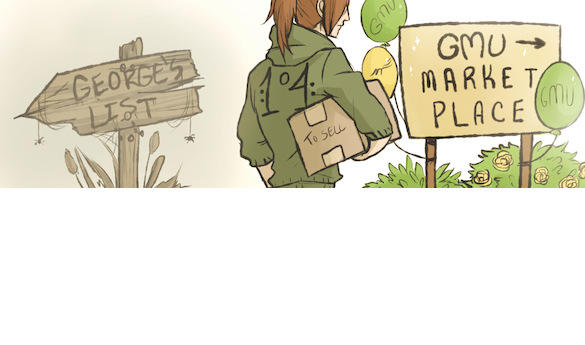Interest in George's List declines as competitors emerge
A little-known Mason tradition is facing declining interest as new competitors emerge. George’s List, Mason’s answer to Craig’s List, competes with websites like GMU Marketplace as the online gathering place for the university’s buyers and sellers.
Junior Adarsh Pradeep visited George’s List before deciding to sell items on GMU Marketplace instead.
“[George’s List’s] interface is ancient,” Pradeep said. “Moreover, there are hardly any users who view George’s List. If I’m trying to sell a product quickly, I’m going to go and post in places where I will get the most responses.”
Pradeep, who successfully sold a TI-84 calculator and multiple books, believes Facebook to be the best platform for selling items.
“[Facebook] allows me to reach a college-aged audience on a site where I know college students are already very active on,” Pradeep said. “You can reach a large targeted audience for free and expect much quicker responses.”
George’s List has experienced declining interest in recent years according to Amy Brener, the director of VPIT/CIO Global Projects at Mason.
“It’s unfortunate,” Brener said. “Its not heavily utilized primarily because people don’t know it exists.”
According to Brener, however, George’s List has the potential to be a popular site.
“I think it’s successful within the realm of what it provides,” Brener said. “It’s just underutilized.”
Brener said that George’s List may not see an increase in activity as long as the ITU and Office of Student Involvement continue to operate it. She believes a fresh perspective from a different organization would be able to build a more popular site.
“No one really owns it,” Brener said. “If there is some student organization that wants to take it over I would be delighted.”
Meanwhile, GMU Marketplace, an online shopping organization unaffiliated with Mason, thrives on Facebook. Users are able to posts a status of their products along with prices and ask for other users to message them for more details. Items for sale range from electronics and textbooks to more lucrative items like workout supplements and a Bud Light charcoal grill.
Brener sees the Facebook marketplace as a nice alternative to George’s List. However, she still believes that George’s List offers many advantages.
“You may find things [on Facebook] that you won’t find on George’s List, things Mason is not okay with,” Brener said. “The posts [on Facebook] aren’t organized by categories.”
Listings on George’s List are approved by Brener and the Office of Student Involvement to conform with Mason policy.
“Posts are vetted,” Brener said. “We reject ads from local clubs that serve alcohol. We deliberately wear our mother’s hats. We err on the side of safety.”
Corrine House, the communications manager for the Office of Student Involvement, runs a team of three who help vet the listings.
“We go online and approve all of the more noncommercial sales and ads,” House said. “Anything that’s more of a company ad [will be rejected]. We look for things local to Mason and the community.”
Brener, who helped to create George’s List with two other now-retired ITU staffers, continues to operate as the program head with assistance from the Office of Student Involvement.
“The original thought of George’s List was to provide a vehicle for faculty and staff to sell goods and services with a concern for safety,” Brener, said.
Users have the ability to create a title, assign the product to a category, set a price, write a description and then add up to four images.
“We looked at Craig’s List and we used their categories,” Brener said. “Over the years we’ve added categories and we’ve removed categories.”
The list of 41 categories includes clothing, furniture, textbooks, housing for rent, child care and ride share. George’s List was designed to be cheap and easy to run.
“We deliberately made it as low maintenance as possible,” Brener said. “It’s barebones because we want to keep it simple. I don’t think it costs anything. The database is small and it’s on an existing server.”

